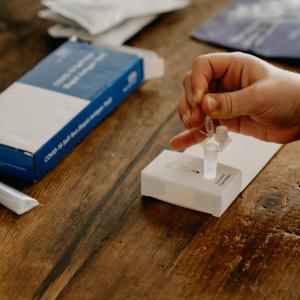You are here
Daily testing vs self-isolation during the COVID-19 pandemic
11 August, 2023

Whilst I was a PhD student at King's College London, I had the opportunity to support the Health Protection Research Unit in Emergency Preparedness and Response (HPRU EPR) during an internship in 2021. I was supported to take the lead for the HPRU on a collaboration with the UK Health Security Agency (UKHSA), NHS Test and Trace, and our sister HPRU at the University of Bristol.
The problem
During 2020 and 2021, people who had been in contact with someone with COVID-19 had to self-isolate at home for 10 days. Self-isolation can have a significant impact on those isolating, as well as a wider impact on society and the economy. For example, in just a single week in February 2021, the UK's NHS Test and Trace service identified 191,242 ‘close contacts’ of people with COVID-19, most of whom will have been legally obliged to self-isolate.
The solution
To relieve the burden of self-isolation, the UK's Chief Medical Officer requested a project to explore how adults might engage with a system of daily lateral flow tests instead of self-isolation, after contact with someone who has COVID-19. This approach, known as "test-to-enable," allowed close contacts to take a lateral flow test at home once a day for up to 6 days. If the test was negative, they could leave their home for up to 24 hours.
The study
The study was conducted in two phases. The first phase was a pilot study to evaluate engagement with test-to-enable. We sent a survey to and interviewed people who chose to take daily lateral flow tests instead of self-isolating and people who did not want to take a daily test. We found that most people preferred daily testing, but this depended on their background and personal circumstances. Most people also found the testing system easy to use and were relieved to have daily confirmation of their COVID-19 status. Following a negative test, some people found it helpful to be able to carry out essential activities such as shopping or the school run. Whilst there were no activity restrictions imposed during the 24 hours following a negative test during the pilot study, most people were cautious in their behaviour and did not engage in any non-essential activities during this time. They reported fewer risky contacts than before taking part in the trial.
The second phase of the study was a non-inferiority randomised control trial of over 50,000 people, published in The Lancet Respiratory Medicine. The study confirmed that daily testing was non-inferior to self-isolation, which means that the secondary attack rate (the proportion of close contacts of those who were testing or self-isolating who went on to develop COVID-19) was not greater in those who took daily tests. This was important evidence, suggesting that nationally if we used daily testing instead of self-isolation, rates of transmission were unlikely to increase.
The implications
The findings of this study have important implications for public health policy. They suggest that daily testing can be an effective alternative to self-isolation, and that this approach can be used to reduce the burden of self-isolation on individuals and society.
The work informed UK Government policy recommendations (issued 12th December 2021) in which members of the public were able to take daily lateral flow tests, for seven days, to release themselves from self-isolation. This had an immediate beneficial effect for hundreds of thousands of people in the UK, and many more world-wide.
The study also provides vital evidence to inform public health policy and practice in the event of a future pandemic.
My personal benefits
I am grateful for the opportunity to have been involved in this important study. I gained valuable experience in conducting research, writing scientific papers, and communicating research findings to policymakers. I am also proud to have contributed to the development of a public health policy that has had a positive impact on the lives of so many people. I also found the team that I aspired to be part of, and loitered for long enough that I am now a post doc working on the Response theme of the HPRU EPR.
My future plans
I am now working towards pursuing my research interests in the mental health and wellbeing of children and families, with a new perspective on the public health and policy implications that our research can have. I am excited to continue my work in public health, and I am confident that the skills and experience I have gained from this project will be invaluable in my future research.
For more information about this work:
Engagement with daily testing instead of self-isolating in contacts of confirmed cases of SARS-CoV-2
By: Alex Martin




